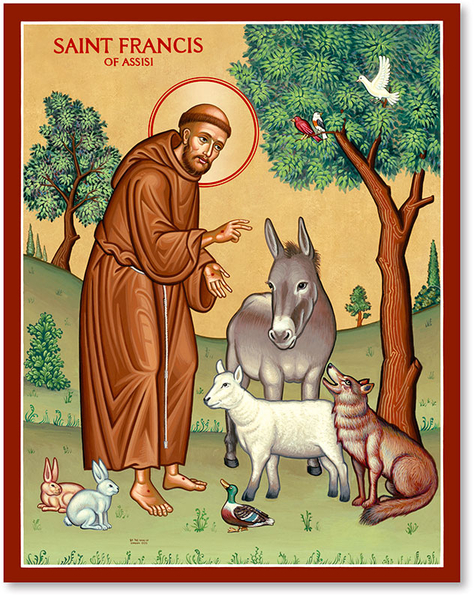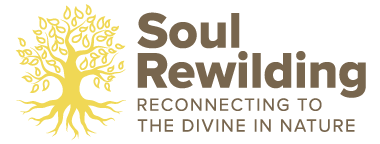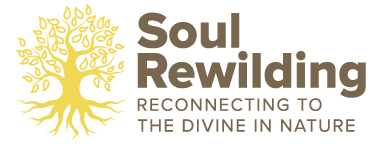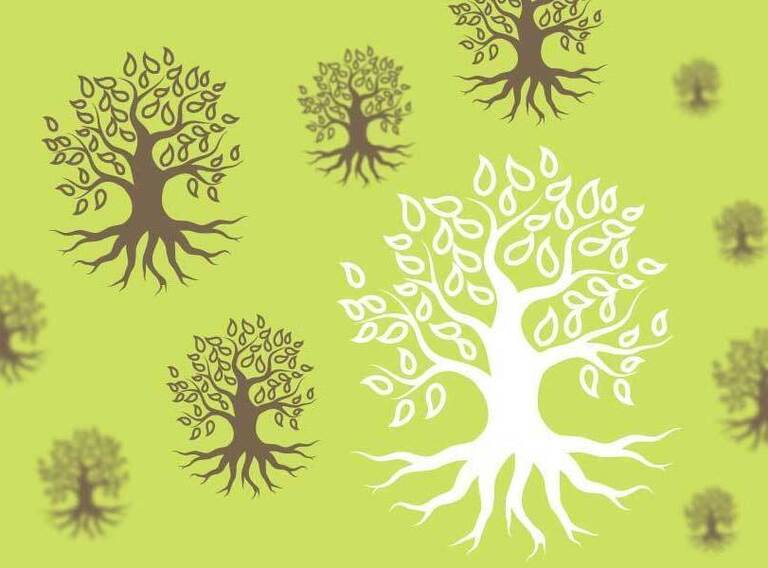Blog

St Francis a paragon of Soul Rewilding
Monday 26th February 2024
Rev Jonathan Herbert
Gratitude
At Hilfield Friary, a Franciscan community nestling at the bottom of a chalk escarpment in rural Dorset, there lives an ancient tree we call the Gospel Oak. This mighty tree has never been formally dated but it’s girth is such that it must be well over 500 years old. To go and sit under its spreading limbs always fills me with a deep sense of gratitude for the wonder and mystery of the natural world. The sense of awe I feel under its canopy is no different and probably greater than sitting in the chancel of a great Gothic cathedral. A fully grown oak supports over 2,300 wildlife species, and as I gawp up at it’s branches stretching out benevolently laden with fresh growth, and imagine its roots deep below the earth spreading connections with mycorrhizal fungi in the woodland wild web, I’m filled with a sense of humility at my short and tiny life compared to its span of life. I sense too that somehow I’m deeply connected to the tree and the huge biodiversity that surrounds it.
One spring which coincided with the Christian season of Lent a group of us from the Friary went to pray silently under the tree for 30 minutes each week. It was a profound time of connection with nature, and seemed to echo Shakespeare’s words ‘one touch of nature makes the whole world kin’. Community member Lynne said” I went out each week to pray for nature and the climate emergency, but as I knelt under that tree I felt that it was praying for me”
Rediscovering this sense of gratitude and the Holy revealed in the natural world, through spending some dedicated time outdoors, is an essential first step in soul-rewilding. Living my life amidst the trees, fields, animals and people of Hilfield Friary kindles in me a real sense of joy, and is something we try and share with the many who visit here.
Facing Our Fears
Born into wealth in 1180 Francis of Assisi was a true urbanite, and liked nothing more than to be out and about town eating drinking and carousing with his friends, so much so that he was named ‘Lord of the Revels’. He longed too, to be a knight and have the honour of military conquest. At the battle of Collestrada, he had a rude awakening to the bloody realities of war, seeing friends die and being held hostage for a year until his father paid a ransom. I often wonder what fears Francis encountered in battle and subsequent imprisonment. He certainly returned to Assisi a changed character and took to spending time alone roaming the countryside and praying in churches and outdoors. In his final Testament, Francis tells us that it was his meeting with a leper that transformed his fear of the ‘other’. Francis had been terrified of lepers and feared catching the disease which would have made him an out cast, but as he rode past a leper he heard him call out ‘for the love of God help me!’ something made Francis turn around stop and embrace the leper. He writes ‘that which had previously nauseated me became the source of spiritual and physical consolation for me. Joanna Macey author of ‘Active Hope, describes such an encounter as ‘honouring our pain’, and suggests that if we are to move on from so much of the fear and denial that paralyses us in the wake of the climate emergency, we need to learn to sit with our discomfort and let it be transformed. In Francis we see someone turning from fear and denial to a new sense of kinship with the most marginalised people of his day.
Seeing differently
Francis following several conversion experiences also had a growing sense of kinship with the natural world. In his great song of praise the Canticle of the Creatures, Francis talks about Brother Sun, Sister Moon, Sister Water, Brother Fire and Mother Earth. Famously one Giotto’s frescoes has Francis preaching to the birds, Francis was a deep ecologist recognising the essential value of all natural life. His Canticle to the Creatures is an ecstatic celebration of the interconnectedness of all things. At Hilfield Friary we try to honour Francis intense love of Creation by caring for and nurturing the rich bio-diversity of our 45 acres of land. Wild flower meadows support 8 species of orchid, numerous grasses, insects and small mammals, many of which move up and down our hedgerows which we lay by hand every few years. Swallows, house martins and bats hover around our fields and buildings by summer and all kind of wetland plants thrive in our deliberately flooded woodland. We grow a lot of vegetables in our deliberately scruffy companion planted vegetable garden, but we don’t aim to be self-sufficient. The term self-sufficient suggests a rugged individualism which we reject, believing rather in nurturing a sense of connection with all life. We don’t plant the trees that produce most fruit, but rather the ones that promote most bio-diversity.
Going forth
Life at Hilfield isn’t about living in a bubble, but rather inviting people in to share in a life that seeks to mirror the joy of Francis in his connection with the natural world and his desire to make peace between all peoples. Many people come to us for times of retreat and reconnection with nature. The community has promoted a conservation cluster of neighbouring land owners, members are involved with promoting Eco-Church, work with refugees, Gypsies and Travellers and Climate protest. In December 2021 we celebrated 100 years of the Friary by planting 100 oak trees, a sign of hope for coming years.
Jonathan Herbert is author of ‘Accompaniment Community and Nature’



